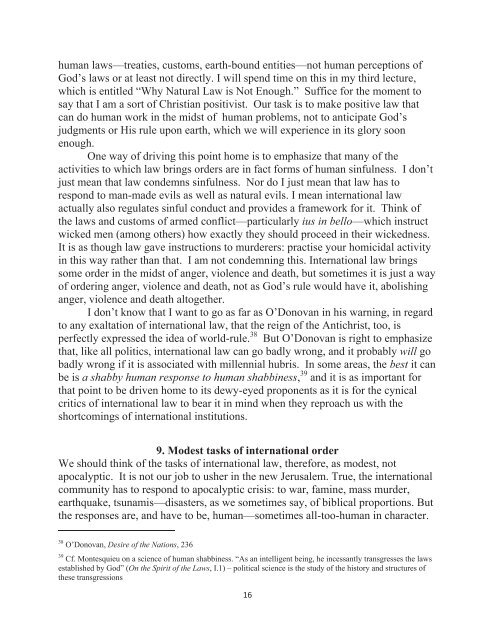International Legal Evangelism: Intelligence, Reconnaissance & Missions
International Legal Evangelism: Intelligence, Reconnaissance & Missions
International Legal Evangelism: Intelligence, Reconnaissance & Missions
Create successful ePaper yourself
Turn your PDF publications into a flip-book with our unique Google optimized e-Paper software.
human laws—treaties, customs, earth-bound entities—not human perceptions of<br />
God’s laws or at least not directly. I will spend time on this in my third lecture,<br />
which is entitled “Why Natural Law is Not Enough.” Suffice for the moment to<br />
say that I am a sort of Christian positivist. Our task is to make positive law that<br />
can do human work in the midst of human problems, not to anticipate God’s<br />
judgments or His rule upon earth, which we will experience in its glory soon<br />
enough.<br />
One way of driving this point home is to emphasize that many of the<br />
activities to which law brings orders are in fact forms of human sinfulness. I don’t<br />
just mean that law condemns sinfulness. Nor do I just mean that law has to<br />
respond to man-made evils as well as natural evils. I mean international law<br />
actually also regulates sinful conduct and provides a framework for it. Think of<br />
the laws and customs of armed conflict—particularly ius in bello—which instruct<br />
wicked men (among others) how exactly they should proceed in their wickedness.<br />
It is as though law gave instructions to murderers: practise your homicidal activity<br />
in this way rather than that. I am not condemning this. <strong>International</strong> law brings<br />
some order in the midst of anger, violence and death, but sometimes it is just a way<br />
of ordering anger, violence and death, not as God’s rule would have it, abolishing<br />
anger, violence and death altogether.<br />
I don’t know that I want to go as far as O’Donovan in his warning, in regard<br />
to any exaltation of international law, that the reign of the Antichrist, too, is<br />
perfectly expressed the idea of world-rule. 38 But O’Donovan is right to emphasize<br />
that, like all politics, international law can go badly wrong, and it probably will go<br />
badly wrong if it is associated with millennial hubris. In some areas, the best it can<br />
be is a shabby human response to human shabbiness, 39 and it is as important for<br />
that point to be driven home to its dewy-eyed proponents as it is for the cynical<br />
critics of international law to bear it in mind when they reproach us with the<br />
shortcomings of international institutions.<br />
9. Modest tasks of international order<br />
We should think of the tasks of international law, therefore, as modest, not<br />
apocalyptic. It is not our job to usher in the new Jerusalem. True, the international<br />
community has to respond to apocalyptic crisis: to war, famine, mass murder,<br />
earthquake, tsunamis—disasters, as we sometimes say, of biblical proportions. But<br />
the responses are, and have to be, human—sometimes all-too-human in character.<br />
<br />
38 O’Donovan, Desire of the Nations, 236<br />
39 Cf. Montesquieu on a science of human shabbiness. “As an intelligent being, he incessantly transgresses the laws<br />
established by God” (On the Spirit of the Laws, I.1) – political science is the study of the history and structures of<br />
these transgressions<br />
<br />
16

















